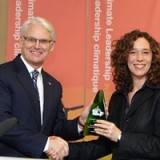The refusal of Premier Clark to represent BC at the annual Western Premiers’ Conference is a disgrace!
This is a very important conference. It allows Premiers to discuss many important issues. No doubt the Enbridge and Kinder Morgan pipelines and resultant tanker traffic will be on the agenda and Clark hasn’t the guts to deal with this. This means that when Alberta Premier Alison Redford, who favours the pipelines and tankers, raises this issue, whether on or off the record, there will be no premier of BC to put our views on the table.
It wasn’t until Bill Bennett, in 1976, pressed the matter that BC was even part of this process. I went to all five conferences when I was in cabinet and was made chair of a special WPC committee to assess federal intrusion into provincial constitutional rights which became very important during the later run-up to patriating the Constitution. This is but one example of many where the conference becomes a political power in the country.
Premier Clark has obviously concluded that notwithstanding the photo-ops this conference would provide, the prospect of making an ass of herself is more important.
All British Columbians have been shamed by this bad excuse for a Premier.





